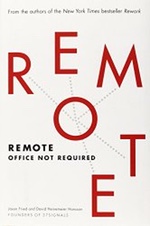Remote. Office not Required

Jason Fried and David Heinemeier Hansson are known for 37signals. David HH is also the creator of Rails, the most used framework for Ruby web programming. I’ve read and enjoyed both Getting Real

This book shares practical experience about working remotely, taken from 37Signals and some other companies. The authors spend a lot of time explaining the benefits of remote work, the resistance one may encounter against it, and the most common excuses for not allowing remote work. That is, prejudices like that innovation happens only face-to-face, or that people can’t be trusted to be productive at home, or that company culture would wither away if remote work is allowed…
As a consultant I rely on remote work a lot. I think that a mix of remote work of some kind is in the future of many positions. But I have to say that I was disappointed by this book, specially after the expectations raised by the authors in the Introduction:
Above all, this book will teach you how to become an expert in remote work. It will provide an overview of the tools and techniques that will help you get the most of it, as well as the pitfalls and constraints that can bring you down.
This book will give you insights on remote work, but won’t help you become an expert, or give you much in tools and techniques.
The ideas that the authors share are not new. You don’t need to read this book to realize that interruptions are bad for your concentration and productivity1. The examples given of companies and their use of remote work are poor. The examples are real, but they barely descend to any detail about the implementation, or the problems encountered. More important, there is no mention of the impact of remote work on things like work climate, productivity, meeting deadlines, client satisfaction, or the bottom line. From a more conceptual point of view, a question one would expect to be answered by the book is what are the key factors for a position to be considered for remote work?
The authors often use 37signals as a self-reference for remote working practice. For example, at one point the authors mention than Jason (Fried) usually starts working at home at 7:30 a.m. and arrives at the office at 11 .a.m. Great, but Jason is the CEO of his own company, and as most CEOs do, he organizes his time as he sees fit. But how does this apply to a second-level manager of a big company? Or to a sales supervisor?
Many of the ideas mentioned, in my opinion, depend more on the company’s culture that on allowing remote work or not. 37Signals grew up being remote from the start, and has managed to remain a small workforce of great talented people. But established companies with years of operation and an established culture need more than good reasons to implement such changes, at least company wide.
Find Remote: Office not Required in Amazon.
- To give credit to the authors, the ideas are not new now because both of them have spent many years preaching the virtues of remote work. ↩